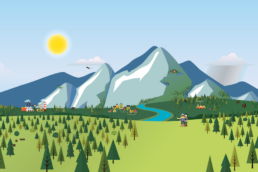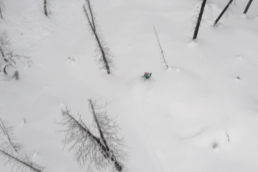The federal government has announced the Canadian Mountain Network will receive $18.3 million in funding over the next five years through the Networks of Centres of Excellence program.
There’s some important news to share throughout the communities and regions that support Kootenay Mountain Culture and Coast Mountain Culture magazines — especially those of us concerned about the future of Canada’s mountainous regions. The Canadian Mountain Network (CMN), who you may have learned more about through their public awareness efforts in past issues of KMC and CMC, and on this website, hast just received vital support from the federal government in the form of an $18.3 million grant to be given out over the course of the next five years from 2019 to 2024.

Minister of Science Kirsty Duncan made the announcement April 16 saying the new funding is part of the Networks of Centres of Excellence program. With this grant, CMN will act as a catalyst for improving Canada’s ability to identify and respond to changing conditions in its vast mountainous regions.
Hosted by the University of Alberta, CMN’s vision is that all Canadians benefit from state-of-the-art research, tools, and training that embody multiple ways of knowing. The goal is for decision making and action to enhance the sustainability and well-being of our mountain places and peoples.
The Mountain Culture Group and the Canadian Mountain Network have worked collaboratively over the past several years to advocate for the importance of mountain research, including through their partnership to promote and expand International Mountain Day celebrations in Canada. These events provide a valuable opportunity to connect mountain research with mountain communities and we look forward to growing this movement in the years ahead.
A key focus of the Network’s approach and activities is to support reconciliation through research by creating opportunities for collaboration. CMN’s research agenda will support projects based on partnerships across disciplines and sectors, including projects led by Indigenous communities and based on Indigenous research methodologies.
Quick Mountain Facts
- Mountains cover 22% of the earth’s land surface and 25% of Canada’s land surface. Mountain ranges in Canada cover over 1.5 million km squared, seven times the area of the European Alps.
- Mountains host 25% of terrestrial biodiversity and 28% of earth’s forests.
- Mountains are the water towers of the world, sourcing water for approximately half of humanity. In North America, they collect two-thirds of the continental snowpack that feeds many of our river systems.
- Canada’s extensive mountain ranges are experiencing rapid and disruptive change. Recent estimates, for example, suggest that over 70% of the ice in mountain glaciers will disappear this century. They are the source of many of Canada’s great prairie, Pacific, and northern rivers.
- Human use of mountains is changing, with ever-increasing numbers of people and goods travelling to and through mountains in Canada. For example, over the past decade traffic volume on the TransCanada highway through Rogers Pass, BC, has grown by 30%, and the number of visitors to Banff National Park increased 23% in the last decade to over 4 million people in 2017.
- Mountain Tourism accounts for 15-20% of the global tourism industry.
- The United Nations General Assembly has designated December 11th as International Mountain Day.
- One of the 2030 targets of the UN Sustainable Development Agenda is to ensure the conservation of mountain ecosystems, including their biodiversity, in order to enhance their capacity to provide benefits that are essential for sustainable development.
Related Stories
Insane Mountain Beat Boxin’
We don't know who this guy is, or where he came from. He showed up at the Kootenay Coldsmoke PowderKeg Slopestyle last…
10 Years of KMC
The new winter edition of KMC marks the 10th anniversary of the publication, and the Nelson Star recently caught up…
Canada’s Rocky Mountain Bicycles Celebrates 40 Years
How Canadian mountain bike company Rocky Mountain Bicycles is celebrating four decades of stoke. Giddy up, eh. By…
The Gathering at Red Mountain
This upcoming Easter weekend RED and POWDER Magazine are presenting the 2nd annual Gathering at RED. Come hang with…
Great Canadian Birds Eye Beautifulness
There is so much great media coming out of the Kootenays these days. Here's a great clip shot and edited by B4apres…








